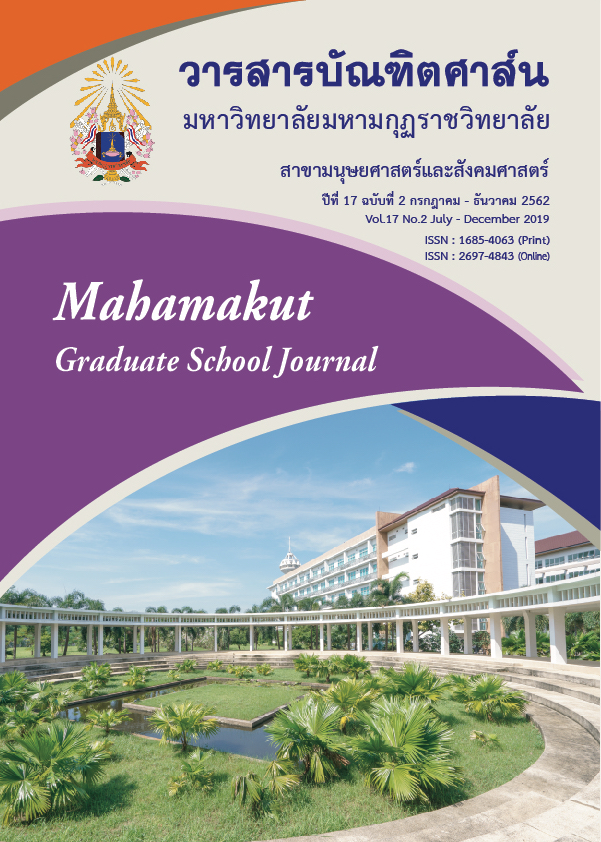การศึกษาเชิงวิเคราะห์จริยธรรมของนักปกครองที่ปรากฎในวรรณกรรมมหาภารตะ
คำสำคัญ:
จริยธรรม, นักปกครองบทคัดย่อ
การวิจัยครั้งนี้มีวัตถุประสงค์ 1) เพื่อศึกษาแนวคิดทฤษฎีเกี่ยวกับจริยธรรมของนักปกครอง 2) เพื่อศึกษาประวัติความเป็นมาและจริยธรรมที่ปรากฏในวรรณกรรมมหาภารตะ 3) เพื่อศึกษาวิเคราะห์จริยธรรมของนักปกครองที่ปรากฏในวรรณกรรมมหาภารตะ
ผลการวิจัยพบว่า :
1) จากการศึกษาแนวคิดทฤษฎีเกี่ยวกับจริยธรรมของนักปกครอง จริยธรรมนั้นเป็นสิ่งที่อยู่คู่ในตัวมนุษย์โดยธรรมชาติ ซึ่งมีการพัฒนาขึ้นโดยอาศัยการขัดเกลาทางสังคม ผ่านกฎเกณฑ์ กฎหมายจารีตปะเพณี ค่านิยมของสังคม ความประพฤติที่ถูกหล่อหลอมด้วยการศึกษาจาก หลักศีลธรรม หลักปรัชญา โดยมีจุดมุ่งหมายเพื่อความสุขของตนเองและประโยชน์สุดต่อตนเอง สังคมและประเทศชาตินอกจากนี้จริยธรรมนั้น ยังใช้เป็นแนวทางในการตัดสินใจเพื่อเลือกประพฤติปฏิบัติ เป็นไปเพื่อความถูกต้องเหมาะสมดีงาม มีลักษณะที่สังคมนั้นพึงประสงค์ซึ่งจะทำให้เกิดความสงบสุข เกิดประโยชน์แก่ตนเองและผู้อื่นสังคมและประเทศชาติ เหนือสิ่งอื่นใดจริยธรรมนั้นสิ่งที่แสดงออกถึงความยอมรับนับถือคนในสังคมซึ่งทำให้สามารถใช้ชีวิตอยู่ได้อย่างปกติสุข เป็นบุคคลที่เป็นพลเมืองที่มีคุณภาพ
2) จากการศึกษาประวัติความเป็นมาของวรรณกรรมมหาภารตะ พบว่า วรรณกรรมมหาภารตะเป็นเรื่องราวระหว่างตระกูลเการพและตระกูลปาณฑพ ซึ่งสืบสายโลหิตเดียวกัน ฝ่ายปาณฑพ ประกอบด้วยพี่น้อง 5 คน ฝ่ายเการพ ประกอบด้วยเหล่าพี่น้อง ทั้ง 100 คน ความขัดแย้งของสองตระกูลนี้ ได้สั่งสมมาตั้งแต่ในวัยเยาว์ ตั้งแต่การทะเลาะเบาะแว้งกันตั้งแต่ในวัยเด็ก เมื่อเติบโตขึ้นความขัดแย้งก็ทวีความรุนแรงมากยิ่งขึ้น ความขัดแย้งนั้นขยายตัวไปสู่เครือญาติและพันธมิตรของทั้งสองฝ่าย จนไม่สามารถยุติลงได้ จนทำให้ทั้งสองฝ่าย ได้ทำการรวบรวมพันธมิตรไพร่พล กองทัพ มาเผชิญหน้ากันและได้ทําสงครามกันที่ทุ่งราบกุรุเกษตร ใกล้แม่น้ำยมุนา เป็นเวลา 18 วัน และจบลงด้วยชัยชนะของฝ่ายปาณฑพ
3) จากการศึกษาวิเคราะห์จริยธรรมนักปกครองที่ปรากฏในวรรณกรรมมหาภารตะพบว่าในวรรณกรรมมหาภารตะนั้นมีความสมบูรณ์ทั้งเรื่องหลักการของการเป็นนักปกครอง โดยมีการกล่าวถึง ส่วนในเรื่องจริยธรรมในตัวของนักปกครองนั้นผู้วิจัยพบว่านักปกครองในวรรณกรรมมหาภารตะนั้นได้ให้ความสำคัญต่อการทำหน้าที่ ความเสียสละ ความซื่อสัตย์ ความกล้าหาญทางจริยธรรม ความกตัญญู ความสามารถในการจูงใจคน การรู้จักใช้บุคคลความเชี่ยวชาญในการรบ และการอ่อนน้อมถ่อมตน ซึ่งเป็นจริยธรรมที่หน้าปกครองผู้ปกครองนั้นต้องนำไปประพฤติปฏิบัติซึ่งเป็นหลักของนักปกครองที่ที่กล่าวมานี้สามารถใช้ในปัจจุบันได้
เอกสารอ้างอิง
ข้อมูลปฐมภูมิ
พระไตรปิฎกภาษาไทย ฉบับมหาจุฬาลงกรณราชวิทยาลัย.2539.เล่มที่ 15. กรุงเทพมหานคร : โรงพิมพ์มหาจุฬาลงกรณราชวิทยาลัย
พระไตรปิฎกภาษาไทย ฉบับมหาจุฬาลงกรณราชวิทยาลัย.2539.เล่มที่ 28. กรุงเทพมหานคร : โรงพิมพ์มหาจุฬาลงกรณราชวิทยาลัย
ข้อมูลทุติยภูมิ
หนังสือทั่วไป
กรุณา – เรืองอุไร กุศลาสัย. (2533) , มหาภารตยุทธ.กรุงเทพมหานคร :คณะกรรมการศาสนาเพื่อการพัฒนา,พิมพ์ครั้ง ที่ 2
บทความในวารสาร
ศรัณย์ วงศ์คำจันทร์.(2555). จริยธรรมนักการเมืองไทย. วารสารวิจัย มข. 2 (3) : กรกฎาคม-กันยายน 2555,
สุกิจ ชัยมุสิก.(2558). คุณธรรมจริยธรรมสำหรับนักปกครอง.วารสารบัณฑิตศาส์น มมร.ปีที่ 13 ฉบับที่ 2 กรกฎาคม – ธันวาคม 2558
อินเตอร์เน็ต
ลิขิต ธีรเวคิน (2549) สืบค้นเมื่อ 17 สิงหาคม 2560. จาก http://www.manager.co.th
ณัฐดนัย แก้วโพนงาม.(2556) จริยธรรมของนักการเมืองในระบบการเมืองปัจจุบัน สืบค้นเมื่อ 18 สิงหาคม 2560,จาก http://www.geocities.com/nuremrum/whatisethics.html
วิทยานิพนธ์และงานวิจัยที่เกี่ยวข้อง
พระครูโสภิตกาญจโนภาส (เจร รัตนรัตน์ ). (2556). วิเคราะห์จริยธรรมนักปกครองที่ปรากฏใวรรณกรรมสามก๊ก. (วิทยานิพนธ์ศาสนศาสตรมหาบัณฑิต มหาวิทยาลัยมหามกุฏราชวิทยาลัย)
2.ภาษาอังกฤษ
Dailynews. (Online). Retrieved May 17, 2012, from http:www.dailynews.co.th./politics/6562.
Thairath. (Online). Retrieved May 16, 2012, from http:www.Thairath.co.th./ content/pol/259706.
Thairath. (Online). Retrieved May 17, 2012, from http:www.Thairath.co.th./ content/pol/259706.
ดาวน์โหลด
เผยแพร่แล้ว
รูปแบบการอ้างอิง
ฉบับ
ประเภทบทความ
สัญญาอนุญาต
บทความวิชาการและบทความวิจัยในวารสารฉบับนี้ถือเป็นความรับผิดชอบของผู้เขียนเท่านั้น บทความที่ได้รับการตีพิมพ์ในวารสารบัณฑิตศาส์น ถือเป็นลิขสิทธิ์ของมหาวิทยาลัยมหามกุฏราชวิทยาลัย ตามพระราชบัญญัติลิขสิทธิ์



